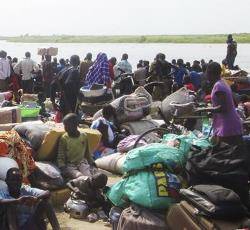S Sudan declares emergency in two states
02/01/2014| IslamWeb
South Sudanese President Salva Kiir has declared a state of emergency in two states, according to the government's official Twitter account.
The decree issued on Wednesday covers Unity and Jonglei, where government troops and rebel forces loyal to Riek Machar, former vice president, have been engaged in fighting.
The declaration came as the rival factions were set to open talks in Ethiopia on Thursday, aimed at bringing an end to the nearly three-week-old conflict, despite reports of an imminent military showdown in Jonglei.
Sources said government and rebel negotiators arrived in the Ethiopian capital Addis Ababa on Wednesday.
Getachew Reda, Ethiopian government spokesman, said the talks would focus on "monitoring mechanisms for the ceasefire".
Following the fall of Bor, Jonglei's state capital, into the hands of the rebels on Tuesday, the government and rebels loyal to Machar agreed to meet for talks.
The South Sudan government, however, refused to call it a ceasefire, saying negotiators must first agree on "mechanisms" for talks to move forward.
Fierce battle imminent
For his part, Kiir named eight negotiators to represent his government in the proposed talks in Ethiopia, Al Jazeera's Mohammed Adow reported from the South Sudanese capital Juba on Wednesday.
Despite the preparations for the talks, thousands of government troops were making their way to Bor in an effort to wrest back control of the Jonglei state capital, setting up another possible fierce battle with rebels.
Aljazeera correspondent quoted government sources as saying that "it is just a matter of time" before they retake Bor, which was captured by rebels on Tuesday.
Fighting is also going on in other fronts like Mayom and Malakal, he said.
Violence first erupted in South Sudan on December 15, when Kiir accused Machar of attempting a coup.
Machar has denied this, in turn accusing Kiir of conducting a violent purge of his opponents.
The fighting has since spread across the country, with the rebels seizing several areas in the oil-rich north.
Thousands of people are feared dead, UN officials said, while close to 200,000 civilians have been forced to flee their homes - many seeking refuge with badly overstretched UN peacekeepers.
Jacob Kurtzer, a representative of the International Committee of the Red Cross, told Al Jazeera that refugees need immediate help.
The UN has said it will do everything it can to prevent further "terrible acts of violence" in South Sudan.
"We have seen terrible acts of violence in the past two weeks, there has been killings and brutality, grave human rights violations and atrocities committed," Hilde Johnson, UN special representative to South Sudan, told Al Jazeera.
The conflict has been marked by an apparent surge in ethnic violence pitting members of Kiir's Dinka tribe against Machar's Nuer community.
Continuing 'atrocities'
The UN Mission in South Sudan (UNMISS) said "atrocities are continuing to occur" across the country despite efforts to negotiate a ceasefire.
"UNMISS is gravely concerned about mounting evidence of gross violations of international human rights law that have occurred in South Sudan during the past 15 days," it said in a statement, reporting "extra-judicial killings of civilians and captured soldiers" and the "discovery of large numbers of bodies" in Juba, Bor and Malakal, the main town in oil-producing Upper Nile state.
UNMISS has said it is "actively collecting information" on the atrocities to be used for future official investigations.
Ban Ki-moon, the UN secretary-general, has already given warning that senior South Sudanese figures "will be held personally accountable" for any crimes against humanity.
Johnson, the UN special representative, has said there is evidence that South Sudanese citizens are being targeted "on ethnic grounds".
"This can lead to a perpetual cycle of violence that can destroy the fabric of the new nation," she said.
"We need to do everything possible to prevent such a cycle of violence between communities of South Sudan."
However, Matthew Leriche, a South Sudan political analyst, told Al Jazeera the fighting is "very much a political struggle" rather than an ethnic conflict.
He noted that Kiir and Machar belonged to the same government and the same party, until they split due to political differences.
PHOTO CAPTION
People displaced from fighting between the South Sudanese army and rebels, wait for boats to cross the Nile River, in Bor town, around 180 km (112 miles), northwest from the capital of Juba December 30, 2013.
Al-Jazeera

